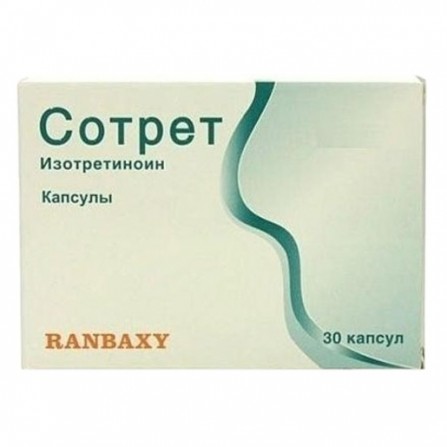Erase capsules 10 mg 30 pcs.
Condition: New product
1000 Items
Rating:
Be the first to write a review!

More info
Active ingredients
Isotretinoin
Composition
Capsules 1 capsule. isotretinoin 10 mg.
Pharmacological effect
Remedy for the treatment of acne. It contributes to the normalization of the terminal differentiation of cells, inhibits the epidermal hyperproliferation of the excretory ducts of the sebaceous glands, the formation of detritus and facilitates its evacuation. Due to this, the production of sebum is reduced, its secretion is facilitated, the composition is normalized, the inflammatory reaction around the glands is reduced. When applied externally and systemically, it has antiseborrheic, sebiostatic, anti-inflammatory, kerato and immunomodulating effects; enhances the regeneration processes in the skin.
Pharmacokinetics
After ingestion isotretinoin is absorbed from the gastrointestinal tract, absorption may increase when taken with food. Cmax in plasma is achieved 1-4 hours after ingestion. Oral bioavailability is low, which may be due to parietal metabolism in the intestinal wall and the effect of "first passage" through the liver. Isotretinoin is highly bound to plasma proteins. It is metabolized in the liver to form the main metabolite of 4-oxo-isotretinoin, and some isomerization of isotretinoin to tretinoin also occurs. Isotretinoin, tretinoin and its metabolites undergo enterohepatic recirculation. The final T1 / 2 of tretinoin is 10–20 h. The equivalent amount is determined in the feces, mostly unchanged, and in the urine in the form of metabolites.
Indications
For oral administration: severe forms of nodular cystic acne, especially with localization on the body. For rectal use: severe recurrent forms of acne, rash with concomitant seborrheic process. For external use: papulopustular acne, seborrhea, rosacea, perioral dermatitis.
Contraindications
Pregnancy, established and planned, lactation, hypersensitivity to isotretinoin, simultaneous use of tetracycline antibiotics. For oral administration: severe dysfunction of the liver and / or kidneys, hypervitaminosis A, significantly elevated levels of lipids in the blood plasma, neoplasms. For rectal use - diseases of the rectum.
Use during pregnancy and lactation
Isotretinoin has a pronounced teratogenic and embryotoxic effect.Contraindicated in established and planned pregnancy. Contraindicated during lactation.
Dosage and administration
For oral administration, the initial dose is 500 mg / kg / day; the maximum daily dose is applied for a limited time and is 1 mg / kg; maintenance dose - 0.1-1mg / kg / day; the duration of treatment is 16 weeks, the repeated course is carried out with an interval of 8 days. Accepted with meals in 1 or more receptions. Rectal - 0.5-1 mg / kg 1 time / day at night (in the supine position); the course of treatment is 8-12 weeks, the intervals between courses are 1-2 months. Ointment is applied with a thin layer to the affected skin 2 times / day. The duration of treatment is 4-6 weeks.
Side effects
Dermatological reactions: dry mucous membranes, skin rash, dermatitis, itching, cheilitis, erythema (especially on the face), sweating, palm-plantar peeling, paronychia, dystrophy of nails, increased proliferation of granulation tissue in the affected area; rarely - thinning hair, vasculitis, photosensitivity. On the part of the senses: conjunctivitis, photophobia, decreased night vision, corneal clouding, hearing loss. From the side of the central nervous system and peripheral nervous system: headache; rarely, depression, seizures, suicidal tendencies; in rare cases, intracranial hypertension. On the part of the digestive system: nausea; rarely - colitis, bleeding from the gastrointestinal tract, transient increase in liver transaminase activity; in rare cases - hepatitis. On the part of the hematopoietic system: anemia, neutropenia, change in platelet count, increased ESR. On the part of the metabolism: an increase in the concentration of TG, glucose. From the musculoskeletal system: pain in muscles and joints; rarely - hyperostoses. Other: nosebleeds. With rectal and external use: at 1-2 weeks of treatment, the appearance of new rashes, itching, swelling and redness of the skin.
Interaction with other drugs
The action of isotretinoin is attenuated with the simultaneous use of progesterone in microdoses. With the simultaneous use of isotretinoin and vitamin A may increase toxic effects. With simultaneous use of isotretinoin and aminoglycoside antibiotics, there is a risk of developing intracranial hypertension.
special instructions
Rectally and externally used with caution in diseases of the liver, kidney, chronic pancreatitis, cardiac decompensation, chronic intoxication (including alcohol). With rectal and external use with a pronounced reaction of exacerbation (1-2 weeks of treatment), it is recommended to cancel treatment for a few days until it subsides, then therapy can be resumed. When ingestion requires regular monitoring of liver function and plasma lipid levels before treatment, 1 month after the start of therapy, and then every 3 months. For diabetes, obesity, alcoholism or lipid metabolism disorders, more frequent monitoring of laboratory parameters is recommended. With diabetes or suspected it is necessary to strictly control the level of glucose in plasma. With prolonged use may develop symptoms of chronic hypervitaminosis A. During the period of treatment or for some time after its termination, it is impossible to be donors for women of childbearing age. During therapy, patients should not be prescribed UV therapy, patients should avoid direct exposure to solar radiation. In the process of treatment may occur intolerance to contact lenses. The safety of use in children and patients of prepubertal age has not been established. The simultaneous use of isotretinoin and derivatives of 19-nortestosterone should be avoided, especially in patients with gynecological / endocrinological diseases. The simultaneous use of other drugs with keratolytic or exfoliative properties (including other retinoids), as well as progesterone in microdoses (including mini pili preparations) is not recommended.


